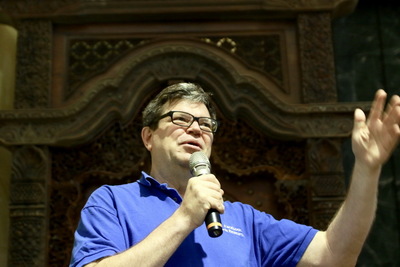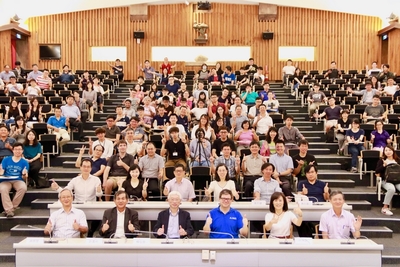Facebook AI Research Director Yann LeCun talks about AI in NCKU


Tainan, Taiwan, July 11, 2017
Yann LeCun, Director of Artificial Intelligence (AI) Research at Facebook, who is recognized as AI pioneer recently gave a talk about the research of AI and shared his insights on the future of AI with a roomful of people at National Cheng Kung University (NCKU), Tainan, Taiwan.
NCKU President Huey-Jen Jenny Su extended her warm welcome to LeCun and in her remarks she quoted from the 2017 Asilomar Conference, “A major change is coming, over unknown timescale but across every segment of society, and the people playing a part in that transition have a huge responsibility and opportunity to shape it for the best.”
She continued, “As we yet to fully explore and define the AI’s potential to reflect either the best or the worst of humanity, let’s remain positive and hopeful that joined force of every partnership in this ambitious endeavor will carefully adopt the necessary ethical guidelines as we continue to break the frontier of the technology barriers, and NCKU pledges our utmost commitment in following this principle.”
“Facebook AI Research is relatively new organization about three and half years and its mission is to advance the state of the art in AI to re-push the science and technology forward,” said LeCun whose expertise is in deep learning speech and image recognition self-driving cars, autonomous ground robots and more.
He commented, Facebook Artificial Intelligence Researchers (FAIR) are committed to advancing the field of machine intelligence.
FAIR actively engage with the research community through publications, open source software, participation in technical conference and workshops, and collaborations with colleagues in academia.
“Our philosophy is open research,” said LeCun. “We publish everything we do, we publish much of our code in open source, and we collaborate with universities and public research labs.”
“We do bottom-up, exploratory research mostly but also have more projects so research scientists basically decide what projects to work on, when some projects become more successful more people can join the projects and eventually become developed projects,” he added.
Some projects are given engineering supports, some projects are more structured, some projects are picked up by development and product groups, he said.
LeCun also identified the three major applications of AI which fascinated him the most. “The first one is automated car which is going to transform the society,” he said. “This will change the way city is designed and change the way people think about transportation.”
“The second thing AI will have a big impact on is medicine. The third one is access to information,” according to LeCun.
He also said that pretty soon we will have technology that allows people to have a some sort of like chatbot. We can ask it any kind of questions, if the answer to the question is somewhere, we will get the answer right away.
Talking about the challenging aspects in AI research, LeCun noted, if we want machines to acquire common sense, we need them to be able to learn like humans, living in the world, acting in the world, seeing the consequences of their actions, that’s the only way to be able to acquire enough knowledge to have common sense emerged.
Enditem/
Yann LeCun, Director of Artificial Intelligence (AI) Research at Facebook, who is recognized as AI pioneer recently gave a talk about the research of AI and shared his insights on the future of AI with a roomful of people at National Cheng Kung University (NCKU), Tainan, Taiwan.
NCKU President Huey-Jen Jenny Su extended her warm welcome to LeCun and in her remarks she quoted from the 2017 Asilomar Conference, “A major change is coming, over unknown timescale but across every segment of society, and the people playing a part in that transition have a huge responsibility and opportunity to shape it for the best.”
She continued, “As we yet to fully explore and define the AI’s potential to reflect either the best or the worst of humanity, let’s remain positive and hopeful that joined force of every partnership in this ambitious endeavor will carefully adopt the necessary ethical guidelines as we continue to break the frontier of the technology barriers, and NCKU pledges our utmost commitment in following this principle.”
“Facebook AI Research is relatively new organization about three and half years and its mission is to advance the state of the art in AI to re-push the science and technology forward,” said LeCun whose expertise is in deep learning speech and image recognition self-driving cars, autonomous ground robots and more.
He commented, Facebook Artificial Intelligence Researchers (FAIR) are committed to advancing the field of machine intelligence.
FAIR actively engage with the research community through publications, open source software, participation in technical conference and workshops, and collaborations with colleagues in academia.
“Our philosophy is open research,” said LeCun. “We publish everything we do, we publish much of our code in open source, and we collaborate with universities and public research labs.”
“We do bottom-up, exploratory research mostly but also have more projects so research scientists basically decide what projects to work on, when some projects become more successful more people can join the projects and eventually become developed projects,” he added.
Some projects are given engineering supports, some projects are more structured, some projects are picked up by development and product groups, he said.
LeCun also identified the three major applications of AI which fascinated him the most. “The first one is automated car which is going to transform the society,” he said. “This will change the way city is designed and change the way people think about transportation.”
“The second thing AI will have a big impact on is medicine. The third one is access to information,” according to LeCun.
He also said that pretty soon we will have technology that allows people to have a some sort of like chatbot. We can ask it any kind of questions, if the answer to the question is somewhere, we will get the answer right away.
Talking about the challenging aspects in AI research, LeCun noted, if we want machines to acquire common sense, we need them to be able to learn like humans, living in the world, acting in the world, seeing the consequences of their actions, that’s the only way to be able to acquire enough knowledge to have common sense emerged.
Enditem/
Provider:
news center
Date:
-2017-07-11